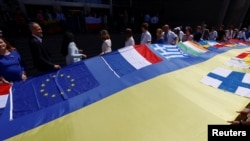The European Parliament voted overwhelmingly Thursday to grant European Union candidate status to embattled Ukraine, pushing it one step closer to Western allies who have been supplying it with massive amounts of armaments to help it fight off Russia’s four-month invasion.
The vote favoring Ukraine was 529-45, with 14 abstentions. The European Parliament also approved EU candidacy for Georgia and Moldova.
The vote came as the U.S. said it was sending another $450 million in military aid to Ukraine, including some additional medium-range rocket systems, on top of the $1 billion in assistance it announced a week ago.
Ukrainian Parliament chair Ruslan Stefanchuk thanked the European lawmakers for their support in a Facebook message, saying, “Ukraine is EU country. And we fight for this right not only on the battlefield but also in the legal sphere.”
In order for the three countries to join the 27-member EU bloc, they will be required to carry out a series of political and economic reforms.
European Commission President Ursula von der Leyen said Ukraine “has already implemented roughly 70% of EU rules, norms and standards.” She said, however, that much needed to be done in the areas of “the rule of law, oligarchs, anticorruption and fundamental rights."
Council vote
The European Council, which comprises the heads of all 27 EU governments, will have the final vote on Ukraine’s membership. The vote must be unanimous. Diplomats say the process could take a decade to complete.
Ukrainian President Volodymyr Zelenskyy said Wednesday that he had spoken to 11 bloc leaders following nine calls with other leaders the day before and planned talks with others on Thursday.
Zelenskyy said the meeting would be a “historic session of the European Council” and that he believed all 27 EU countries would support Ukraine’s membership.
The EU leaders gathered in Brussels discussed the impact of Russia’s war in Ukraine on global food security, as well as additional EU economic, military and humanitarian support for Ukraine.
Zelenskyy said Russia was continuing to launch “massive air and artillery strikes” in eastern Ukraine’s Donbas region, adding that Russia’s goal was to “destroy the entire Donbas step by step.”
The Ukrainian leader called for faster arms deliveries to help his forces match up against those from Russia.
'No letup' in shelling
Kharkiv region Governor Oleh Synehubov said Wednesday that shelling of the residential districts of Kharkiv or other towns in the region had continued unabated.
"There is no letup in the shelling of civilians by the Russian occupiers," he wrote on the Telegram messaging app. "This is evidence that we cannot expect the same scenario as in Chernihiv or Kyiv, with Russian forces withdrawing under pressure."
Ukrainian presidential adviser Oleksiy Arestovych said in a video address that Russian forces were hitting Kharkiv "with the aim of terrorizing the population" and forcing Ukraine to divert troops, Reuters reported.
Microsoft reported Wednesday that Russian intelligence agencies had conducted multiple efforts to hack the computer networks of Ukraine’s allies.
"The cyber aspects of the current war extend far beyond Ukraine and reflect the unique nature of cyberspace," Microsoft President Brad Smith said in the report.
The Russian Embassy in Washington did not immediately respond to a request for comment, Reuters reported. In the past, Moscow has denied conducting foreign cyber espionage missions, saying it "contradicts the principles of Russian foreign policy."
Since the conflict began February 24, Ukrainian entities have been attacked by Russian state-backed hacking groups, Microsoft reported. Researchers found 128 organizations in 42 countries outside Ukraine had also been targeted by the same groups in espionage-focused hacks, the report found.
Nearly two-thirds of the cyberespionage targets involved NATO members, researchers found.
Some information for this report came from The Associated Press, Reuters and Agence France-Presse.




